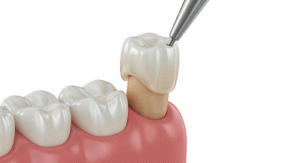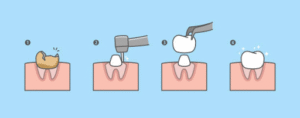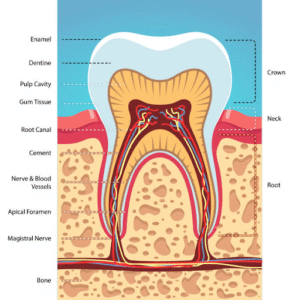
So, “what is a crown for teeth?” Think of a dental crown as a custom-made cap that completely covers your tooth, restoring its shape, size, strength, and improving its appearance. It’s essentially a new outer layer for your tooth, fitted precisely over the part of the tooth that shows above the gums. At Smiles for Health DDS, we often recommend crowns when a tooth is too damaged to be fixed with a regular filling. Understanding the dental crown purpose helps to see how it acts as a protective shield.
Here’s how a dental crown works and its purpose:
- Structure: A dental crown is a fixed prosthetic device, meaning it’s cemented onto your existing tooth (or a dental implant) and can only be removed by a dentist. It’s not like a removable denture.
- Materials: Crowns can be made from various materials, including:
- Porcelain or Ceramic: These are popular choices because they can be matched to the color of your natural teeth, making them a good option for front teeth or for a smile makeover.
- Metal Alloys: Gold, palladium, nickel, or chromium are very strong and durable, good for back teeth where biting forces are high. They are very resistant to wear and seldom chip or break.
- Porcelain Fused to Metal (PFM): These crowns offer both strength and a tooth-colored appearance. The metal provides a strong base, while the porcelain cover blends in with your other teeth.
- Zirconia or E.max: These are newer, highly durable, and aesthetic ceramic materials.
- Purpose of a Crown (The Dental Crown Purpose): The main reasons why getting a tooth crown is recommended are:
- Restore Shape and Size: For teeth that are severely worn down, broken, or have large dental fillings that are failing.
- Strengthen a Weak Tooth: A crown holds together parts of a cracked tooth, preventing it from fracturing further.
- Cover a Dental Implant: If you get a dental implant to replace a missing tooth, a crown is placed on top of the implant post to serve as the visible “tooth.”
- Cosmetic Improvement: To cover severely discolored or misshapen teeth where teeth whitening or veneers aren’t suitable.
- Support a Dental Bridge: Crowns are used on the teeth on either side of a gap to support a dental bridge.
The process of getting a crown typically involves two visits. During the first visit, the tooth is prepared, an impression is taken, and a temporary crown is placed. On the second visit, the permanent crown is cemented into place. Our team at Smiles for Health DDS ensures a comfortable and precise fit, bringing you closer to excellent wellness dentistry. If you’re considering “what is a crown for teeth?” for your situation, contact us for a consultation. Our experienced Dr. Diana Zorro DDS can assess your needs during your next exams and cleanings appointment.
Why Would Someone Need a Tooth Crown?
Now that we’ve covered “what is a crown for teeth,” you might be curious about the specific situations where a dentist would recommend one. The decision to get a tooth crown is usually made when a tooth has suffered significant damage or needs substantial structural support. Understanding why get a tooth crown can help you recognize if it’s the right solution for your dental health. At Smiles for Health DDS, our priority is to preserve your natural teeth whenever possible, and a crown is often the best way to do that.
Here are the common reasons why someone would need a tooth crown:
- Significant Decay or Large Fillings: If a cavity is too large for a standard dental filling to effectively restore the tooth’s structure, a crown provides full coverage and strength. Similarly, if an existing filling is very large and compromises the tooth’s integrity, replacing it with a crown can prevent future fractures.
- Following a Root Canal Procedure: After a root canal, a tooth often becomes more brittle because the pulp (which contains blood vessels and nerves) is removed. A crown is almost always placed over a root canal-treated tooth to protect it from fracturing under chewing pressure, ensuring its long-term function. This is a primary reason why get a tooth crown.
- Cracked or Fractured Teeth: If a tooth has a significant crack that extends into the chewing surface or below the gum line, a crown can hold the cracked pieces together, preventing the crack from worsening and potentially saving the tooth from dental extractions.
- Worn-Down Teeth: Years of grinding (TMJ/TMD treatment can address grinding habits) or acid erosion can severely wear down teeth. Crowns can restore the original shape and height of these teeth, improving bite function and appearance.
- Cosmetic Enhancement: While primarily restorative, crowns can also be used for cosmetic reasons. They can cover severely discolored, misshapen, or poorly aligned teeth that cannot be corrected with simpler procedures like teeth whitening or dental bonding. This is part of a comprehensive smile makeover.
- To Anchor a Dental Bridge: When a missing tooth is replaced with a dental bridge, the adjacent teeth (abutment teeth) are typically crowned to provide strong anchors for the bridge.
In essence, if a tooth is too damaged or weak to stand on its own, getting a tooth crown provides the necessary strength and protection. Our team at Smiles for Health DDS performs thorough exams and cleanings to determine if a crown is the best solution for your unique situation, always aiming for the best outcomes in your wellness dentistry. To explore if a dental crown is right for you, contact us today!
What Are the Different Types of Dental Crowns?
When considering “what is a crown for teeth,” knowing about the various types of dental crowns is important. Not all crowns are made from the same material, and each type offers different benefits in terms of strength, appearance, and cost. Understanding these options helps clarify the dental crown purpose in different scenarios. At Smiles for Health DDS, our team will help you choose the best material for your specific needs, considering factors like the tooth’s location, your biting forces, and your aesthetic goals.
Here are the different types of dental crowns:
- Metal Crowns (Gold Alloys, Base-Metal Alloys):
- Pros: Extremely strong, durable, and resistant to chipping or fracture. They require less tooth reduction than other types. Excellent for back molars where appearance is less of a concern and strong chewing force is needed.
- Cons: Metallic color, which is a significant aesthetic drawback for many.
- Porcelain Fused to Metal (PFM) Crowns:
- Pros: Offer a good balance of strength and aesthetics. The metal provides a strong internal structure, while the porcelain outer layer can be matched to your natural tooth color.
- Cons: Can sometimes show a thin dark line at the gum line (especially as gums recede over time). The porcelain layer can chip or fracture, exposing the underlying metal.
- All-Ceramic or All-Porcelain Crowns:
- Pros: Provide the most natural tooth-like appearance, blending seamlessly with your existing teeth. Ideal for front teeth and for patients with metal allergies. They are translucent, mimicking natural enamel.
- Cons: Can be less strong than metal or zirconia crowns, making them potentially more prone to fracture, especially in areas of high biting force.
- Zirconia Crowns:
- Pros: Extremely strong and durable, rivaling metal crowns in strength. They are also tooth-colored, making them a great option for both front and back teeth. Zirconia is biocompatible and generally well-tolerated.
- Cons: Can be more opaque than traditional porcelain, sometimes making them look less natural, though newer, translucent zircons are improving this. Can be abrasive to opposing teeth if not highly polished.
- Resin Crowns:
- Pros: The least expensive option.
- Cons: They are generally not as durable as other materials and are more prone to wear, fractures, and discoloration over time. Often used as temporary crowns.
The choice of crown material depends on your specific tooth, its location in your mouth, your bite, and your aesthetic preferences. For example, a strong zirconia crown might be perfect for a back molar, while an an all-ceramic crown might be ideal for a front tooth as part of a smile makeover. Our team at Smiles for Health DDS will discuss these options with you in detail during your consultation to determine the best material for your unique needs and ensure your long-term wellness dentistry success. For expert advice on which dental crown is best for you, don’t hesitate to contact us!

How Is a Dental Crown Placed on a Tooth?
You’ve learned “what is a crown for teeth” and why you might need one. Now, you’re probably wondering, “How is a dental crown placed on a tooth?” Knowing the steps involved in getting a dental crown can help you feel more comfortable and prepared for the process. At Smiles for Health DDS, our team makes sure each step is explained clearly, ensuring you have a smooth and precise experience.
Here’s a step-by-step guide to how a dental crown is placed:
- Step 1: Tooth Preparation (First Visit):
- First, we’ll numb the tooth and the surrounding gum tissue so you don’t feel any discomfort.
- Our dentist will then carefully reshape the tooth. This involves removing a small amount of enamel from the top and sides of the tooth. The goal is to create enough space for the crown to fit over it without making the tooth look bulky or affecting your bite. The exact amount removed depends on the type of material chosen for your dental crowns.
- Step 2: Impressions (First Visit):
- After the tooth is prepared, we’ll take a highly accurate impression of your prepared tooth. We’ll also take an impression of the teeth in the opposing jaw to ensure your bite is perfect.
- These impressions are then sent to a dental lab, where skilled technicians will custom-fabricate your permanent crown to match the exact shape, size, and color of your surrounding teeth (if you choose a tooth-colored option like porcelain or zirconia). This meticulous process helps ensure the perfect dental crown purpose is achieved.
- Step 3: Temporary Crown Placement (First Visit):
- While your permanent crown is being made (which usually takes about one to two weeks), we’ll place a temporary crown over your prepared tooth. This temporary crown protects the tooth from sensitivity and damage, and allows you to eat and speak normally until your next appointment. We’ll give you instructions on how to care for your temporary crown.
- Step 4: Final Fitting and Cementation (Second Visit):
- Once your custom permanent crown arrives from the lab, you’ll return for your second visit.
- We’ll remove the temporary crown and carefully check the fit and color of the new permanent crown. We’ll ensure it blends seamlessly with your other teeth, feels comfortable in your bite, and provides the proper dental crown purpose.
- If everything looks and feels perfect, the crown will be permanently cemented onto your prepared tooth using a strong dental adhesive.
- Step 5: Final Adjustments and Polishing:
- After cementation, our dentist will make any final minor adjustments to ensure your bite is comfortable and natural. The crown will then be polished to a smooth finish.
This multi-step process ensures that your new tooth crown is a perfect fit, highly durable, and provides the protection and aesthetic appeal you need for your wellness dentistry. If you’re considering getting a tooth crown, our team at Smiles for Health DDS is ready to guide you through every step. Contact us to schedule a consultation!
How Long Do Dental Crowns Last?
A common question people have after learning “what is a crown for teeth” and how it’s placed is, “How long do dental crowns last?” Investing in a tooth crown is a significant decision for your oral health, and you want to know it will provide lasting benefits. The lifespan of a dental crown isn’t set in stone, as it depends on several factors, including the materials used, your oral habits, and how well you care for it. At Smiles for Health DDS, we aim to provide you with dental crowns that offer maximum durability and longevity.
Here’s a look at the lifespan of dental crowns based on materials, oral habits, and care:
- Material Type:
- Metal Crowns (Gold, Metal Alloys): These are often the longest-lasting, typically lasting 15-30 years or even longer. Their strength makes them highly resistant to wear, chipping, and fracture.
- Zirconia Crowns: Known for their exceptional strength and durability, zirconia crowns can last 10-20 years or more, offering a great balance of longevity and aesthetics.
- Porcelain Fused to Metal (PFM) Crowns: These generally last 10-15 years. While strong, the porcelain layer can sometimes chip or crack, affecting their lifespan.
- All-Ceramic/All-Porcelain Crowns: These can last 5-15 years. While aesthetically superior, they might be more prone to chipping than metal or zirconia, especially in areas of heavy biting force.
- Resin Crowns: These are the least durable, often lasting only 5-7 years due to their softer material. They are more prone to wear and fracture.
- Oral Habits: Your daily habits play a huge role in how long your tooth crown lasts.
- Bruxism (Teeth Grinding/Clenching): If you grind or clench your teeth (which may require TMJ/TMD treatment), you put excessive force on your crowns, which can lead to premature wear, chipping, or even fracture.
- Chewing Hard Objects: Biting on ice, hard candies, or using your teeth to open packages can damage any type of crown.
- Poor Oral Hygiene: Just like natural teeth, crowns can still get decay underneath if proper oral hygiene isn’t maintained, though the crown itself won’t decay. The underlying tooth structure or gum tissue can still be affected.
- Oral Care and Maintenance:
- Regular Brushing and Flossing: Consistent and proper brushing and flossing (twice a day brushing, once a day flossing) are essential to keep the crown and the surrounding gum tissue healthy. This prevents decay around the margin of the crown.
- Routine Dental Check-ups: Regular exams and cleanings at Smiles for Health DDS allow us to monitor the condition of your crown, check your bite, and identify any issues early before they become major problems. We can address issues like marginal leakage or gum inflammation.
- Nightguards: If you have a grinding habit, a custom-made nightguard can protect your crowns and natural teeth.
With diligent home care and regular professional check-ups, your tooth crown can last for many years, providing the intended dental crown purpose and maintaining your wellness dentistry. Our team is here to help you maximize the lifespan of your restorative work.

What Are the Benefits of Getting a Crown?
After understanding “what is a crown for teeth” and the process of getting one, it’s clear that a dental crown is a versatile solution in restorative dentistry. But what are the specific advantages? The benefits of getting a crown go beyond just fixing a problem; they can significantly improve your overall oral health, comfort, and confidence. At Smiles for Health DDS, we frequently see the transformative impact a well-placed tooth crown has on our patients’ lives.
Here are the key benefits of getting a crown:
- Protection for Damaged Teeth: This is perhaps the most significant benefit and the primary dental crown purpose. A crown completely encases a weak or damaged tooth, shielding it from further breakdown. This is particularly crucial for teeth with large dental fillings, extensive decay, cracks, or after a root canal procedure, preventing fractures and potential dental extractions.
- Restores Tooth Structure and Function: Crowns bring a damaged tooth back to its original shape and size. This means you can chew, bite, and speak properly again, restoring full chewing function without pain or discomfort. It allows you to enjoy your favorite foods without worry.
- Enhances Aesthetics and Appearance: Modern crowns, especially those made from porcelain, ceramic, or zirconia, can be meticulously matched to the color, shape, and size of your surrounding natural teeth. This means your crown will blend in seamlessly, improving the overall appearance of your smile. It’s an excellent option for covering discolored, misshapen, or poorly aligned teeth, contributing to a beautiful smile makeover.
- Prevents Further Decay: While the crown itself cannot decay, it creates a sealed barrier around the prepared tooth, making it much harder for new bacteria and food particles to reach the underlying tooth structure and cause further decay or infection.
- Long-Term Solution: As discussed, with proper care, dental crowns are a durable and long-lasting restorative solution. They are designed to withstand the daily stresses of biting and chewing, providing years of reliable service. This makes getting a tooth crown a wise investment in your long-term oral health.
- Increases Confidence: When a damaged or unsightly tooth is restored with a natural-looking crown, it can dramatically boost your self-confidence. You’ll feel more comfortable smiling, laughing, and speaking without self-consciousness. This contributes significantly to your overall wellness dentistry.
- Supports Other Dental Procedures: Crowns are integral to other treatments, such as anchoring a dental bridge to replace missing teeth or serving as the visible tooth on top of a dental implant.
The numerous advantages make why getting a tooth crown a highly recommended and effective treatment for a variety of dental issues. Our team at Smiles for Health DDS is dedicated to helping you achieve a strong, healthy, and beautiful smile. If you think a crown could benefit you, contact us to discuss your options!
Frequently Asked Questions
What is a crown for teeth and how does it work?
A crown for teeth is a cap placed over a damaged tooth to restore its shape, strength, and appearance. Smiles for Health DDS explains that the dental crown purpose is to protect weakened teeth and improve function.
Why get a tooth crown instead of a filling?
Tooth crowns provide more durability and coverage for severely damaged or decayed teeth, unlike fillings which only restore small areas. Smiles for Health DDS highlights this as a key reason for deciding why get a tooth crown.
How long does a dental crown typically last?
With proper care, crowns can last 10 to 15 years or longer. Smiles for Health DDS notes that the dental crown purpose includes longevity and protection of your tooth.
What materials are commonly used for dental crowns?
Crowns can be made from porcelain, metal, ceramic, or resin. Smiles for Health DDS helps patients select the best material based on durability and aesthetics, fulfilling the dental crown purpose.
How is a crown for teeth placed?
The tooth is shaped, an impression is taken, and the crown is custom-made and cemented onto the tooth. Smiles for Health DDS ensures precise fitting to meet the dental crown purpose.
Can crowns be used on front teeth as well as molars?
Yes, crowns are used to restore both front and back teeth. Smiles for Health DDS balances aesthetics and strength when explaining what is a crown for teeth.
Does getting a crown hurt?
The procedure is usually done under local anesthesia, so patients experience minimal discomfort. Smiles for Health DDS prioritizes patient comfort throughout the process.
How do I care for my dental crown?
Good oral hygiene, avoiding hard foods, and regular dental check-ups help maintain crowns. Smiles for Health DDS advises proper care to maximize the dental crown purpose.
Can a crown be repaired if it chips or cracks?
Minor damage can sometimes be repaired, but severe damage may require replacement. Smiles for Health DDS evaluates crown condition during visits.
What are the signs that I need a dental crown?
Signs include large cavities, cracked or weakened teeth, or after root canal therapy. Smiles for Health DDS assesses these factors when discussing why get a tooth crown.
Are dental crowns covered by insurance?
Many dental plans cover part of the cost, but coverage varies. Check with your provider for details.
How long does the crown placement process take?
Usually two visits are needed: one for preparation and impressions, another for crown placement.
Can crowns prevent tooth loss?
Yes, by protecting damaged teeth, crowns help avoid extraction and tooth loss.
Will a crown affect my bite or chewing?
Properly fitted crowns restore normal bite and chewing function without discomfort.
Can I whiten my teeth after getting a crown?
Crowns do not whiten like natural teeth; whitening should be done before crown placement to match colors







